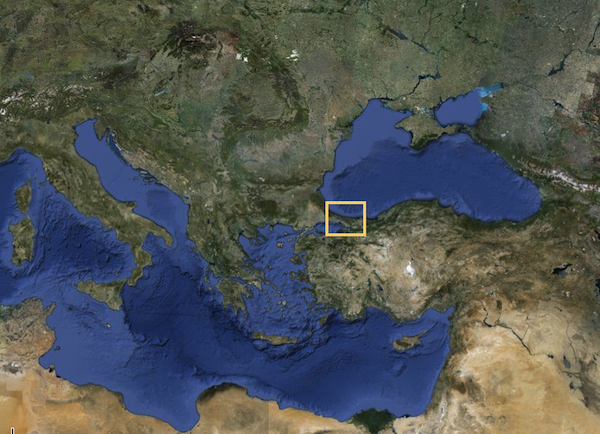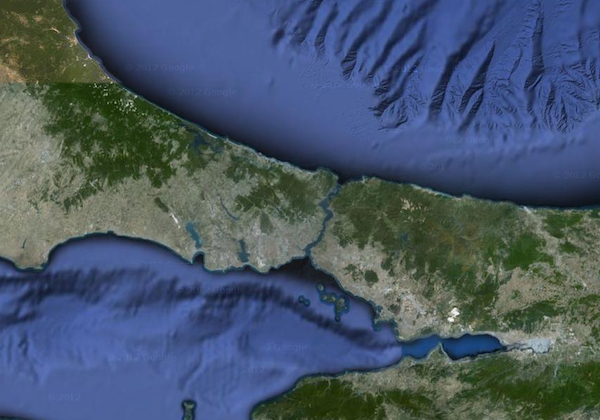A Brief History of Turkey
I admit that when Rachel and I bought our tickets to Istanbul a few months ago, we didn’t even know where to find Turkey on a map. But as we’ve come to learn over our first week here, in order to understand modern day Turkey, you’ve got to understand its history. And to understand its history, you need to know where it is.

Istanbul lies on a what is effectively an isthmus separating Europe from Asia. I say “effectively” because when you zoom in, you see that this isthmus is not a continuous strip of land but is split by a narrow stretch of water - the Bosphorus Straight.

Let’s say you just finished conquering Europe and want to continue your world domination tour into Asia (or vice versa). You’ve got to cross the Bosphorus Straight. If you live on the Black Sea and want to ship goods to and from the rest of the world, you’ve got to traverse the Bosphorus Straight. Conversely, if you’d like to turn the Black Sea into a Great Lake, all you need to do is shut down the Bosphorus Straight.
There is perhaps no more valuable piece of real estate in Eurasia than the banks of the Bosphorus. The first city there, Byzantium, was founded around 700 BC. Soon the Persians rolled through and took control of the area. Then they got kicked out by Alexander the Great and his Greek Squad. Then came the Roman Empire. Then the Byzantine Empire. Then the Latin Empire. Then the Ottoman Empire.
The Ottomans converted the empire to Islam and managed to keep control from the time of Christopher Columbus until they picked the wrong side in the first World War and collapsed under the weight of their over-expansion. Their empire had reached all the way to Vienna.
As the Ottoman Empire fell apart, a Turkish General named Mustaffa Ataturk rose up, and said “Hey, instead of trying to conquer everyone around us, let’s focus our efforts internally. And while we’re at it, let’s do away with this theocratic governing, embrace technology, give women some rights, and build some schools.” (that’s not quite an exact quote.)
Ataturk, who is regarded with a deity-like reverence by nearly every Turk we met, created a secular society, going so far as to outlaw head coverings for women. He felt that religion should be practiced in the home, but not a part of public policy or civics. He also was an isolationist.
Turkey was so successful at keeping out of everyone else’s business that they managed to sit out World War II, which meant they didn’t have to rebuild their infrastructure afterwards. They allied with the US through the Cold War to fend off the USSR, who would have loved to secure Bosphorus access for its ports in the Black Sea. As a US ally, Turkey sent troops to fight in Korea and the first Gulf War, but picked up some Middle East street cred when they declined our invitation to join in on Bush v. Iraq Part II.
Today, Turkey finds itself as a literal and metaphorical bridge between the East and the West.
98% of Turkey’s citizens categorize themselves as Muslim. That said, the metropolitan areas, namely Istanbul, have a distinctly secular culture (for instance, it’s not difficult to find a beer in Istanbul). Istanbul makes up over 20% of the country’s population and is, by far, the country’s economic center. Prevailing public opinion in Istanbul is that the country should continue to modernize, secularize, and Westernize.
There is increasing push-back on this notion, especially in the rural areas that comprise most of the land. The recently elected conservative government has re-instituted Islamic education in the public schools, revoked the ban on head coverings, and demonstrates an increasingly authoritarian opposition towards dissenting opinions.
Turkey’s been trying to join the EU for a number of years. They would be the first Muslim country to do so, though the UN insists that’s not why they have been so far denied. Their independence has insulated them from the EU’s financial difficulties, and Turkey’s economy is booming. As they grow into a regional superpower, Turkey finds itself in a peculiar position in international affairs, maintaining amicable relations with Syria, Iran, Iraq, Egypt, Israel, Palestine, Russia, and the United States.
A friend from Istanbul describes the bridges that span the Bosphorus as a metaphor for Turkey: a modern structure spanning two continents, straining beneath the tension of millions of people moving from West, to the East, and back again.
